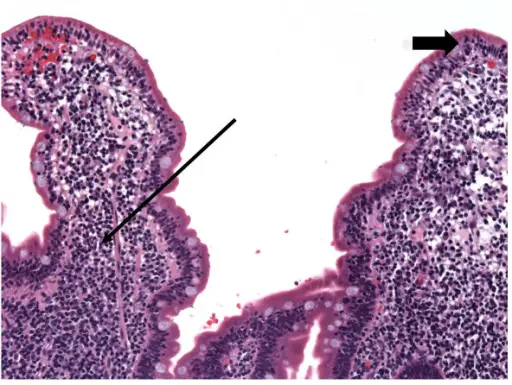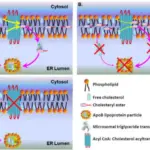Autoimmune enteropathy is a rare condition that causes children to have a lot of diarrheas, often to the point of needing intravenous IV fluids. Autoimmune enteropathy can also affect a child’s ability to absorb food and vitamins.
What is the Pathology of Autoimmune Enteropathy?
The pathology of autoimmune enteropathy is:
-Etiology: The cause of autoimmune enteropathy is when the body’s own immune system attacks itself, and irritates or inflames the lining of the intestine. Sometimes this is a problem only with the bowel or intestines; sometimes the body attacks itself in other places such as the thyroid or other glands in the body.
-Genes involved: FOXP3 and alpha chain of the interleukin-2 receptor genes.
-Pathogenesis: The sequence of events that lead to autoimmune enteropathy are: Exact pathogenesis is unclear. Intestinal epithelial damage from anti-enterocyte antibodies and antigoblet cell antibodies lead to the disaese.
-Histology: The histology associated with autoimmune enteropathy shows celiac-like changes.
How does Autoimmune Enteropathy Present?
Patients with autoimmune enteropathy typically in all genders present at early ages of life. The symptoms, features, and clinical findings associated with autoimmune enteropathy include diarrhea, weight loss, decreased urine output, frequent infections, occasional blood in the stool, and skin rash.
How is Autoimmune Enteropathy Diagnosed?
Autoimmune enteropathy is diagnosed by antinuclear antibody test ANA, endoscopy, and biopsy.
How is Autoimmune Enteropathy Treated?
Autoimmune enteropathy is treated by long-term immunosuppression, steroid-sparing treatment strategies, special diet, intravenous nutrirtion.
What is the Prognosis of Autoimmune Enteropathy?
The prognosis of autoimmune enteropathy is fair. The prognosis of autoimmune enteropathy patients depends on the severity of digestive symptoms including fecal output, on the severity and extension of histological lesions along the gastrointestinal apparatus, and on the presence of extra-intestinal involvement.



